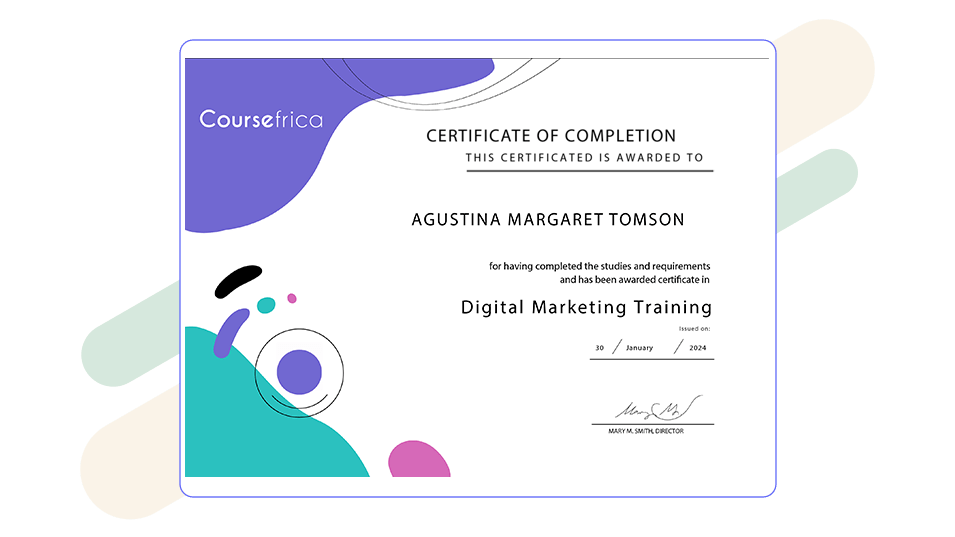
AWS Certification in Nairobi
AWS Certification in London
Are you seeking to acquire essential IT service skills and understand on-demand cloud computing platforms, foster team collaboration, drive value, and enhance web service quality and business growth? Keep your interests no longer at bay! Acquire Study Sail certification in AWS in London. Explore how to:
- Configure and manage servers, storage, and networking.
- Build scalable and fault-tolerant applications.
- Implement encryption, identity management, and compliance.
- Use AWS tools like Lambda and CloudFormation to automate tasks.
- Leverage AWS for big data processing and analytics.
- Implement CI/CD pipelines with AWS Developer Tools

UPCOMING CLASSES
SELECT AN UPCOMING CLASS
AWS CERTIFICATION HIGHLIGHTS
The Most Effective AWS Certification Course in United Kingdom
Great engagement during both live and offline classes
Solving real problems using updated statistical software
Q&A sessions with both peers and tutors to troubleshoot any challenges
Gain AWS tools for continuous integration, continuous deployment (CI/CD), and infrastructure as code
Navigate the recent trends in cloud computing like devops and automation and other related technologies
Authenticate cloud expertise and technical skills in using Amazon Web Services.
UPCOMING CLASSES
SELECT AN UPCOMING CLASS
AWS Certification Curriculum
WHAT WILL I LEARN?
Module Info and Overview
This introductory module will equip you with a foundational understanding of cloud computing, its models, benefits, and challenges. This topic will set the stage for a better understanding of AWS services. By the end of this unit, beginners in AWS will be able to explain the critical role of cloud computing in today’s digital world, its concepts, and features. You will:
- Learn the definition of cloud computing, its benefits, and how it fundamentally changes the IT field.
- Understand the fundamental security concepts that apply to cloud environments.
- Explore the different cloud service models and deployment models such as public, private, hybrid, and community clouds.
- Learn the common challenges that organizations face when adopting cloud technologies.
- Gain insights about the AWS services and its position in the market as a leading cloud service provider.
- Explore different case studies of organizations that use cloud solutions effectively.
Module Info and Overview
The core area of AWS is its services hence, this topic will focus on the services provided by AWS that are essential for building applications in the cloud. You will explore the different techniques of navigating AWS services such as storage, computing, and databases. You will learn:
- How to launch and manage different virtual servers in the cloud and its configuration
- The different features and functionality of Amazon S3 for data retrieval and life cycle management
- About managed database services such as Amazon RDS, how to set up, configure, and management
- How to design and implement virtual networks within the AWS environment including connectivity and security
- How to monitor AWS resources and applications in real-time including setting up dashboards and alerts
Module Info and Overview
This topic delves into the various storage options provided by AWS. It will explore features like object storage, file storage, and block storage. You will also learn how they can be used to store data effectively. Get ready to:
- Learn about S3 for object storage which is a simple storage service including storage classes and security features
- Explore Amazon Elastic Block Store from volume types to performance considerations
- Learn about file storage with Amazon Elastic File System and how to access management
- Learn about archival storage and understand how hybrid cloud storage solutions
- Learn how to manage data versions and backup strategies and tools for restoring data from AWS storage services
- Explore data encryption options for AWS storage services such as server-side and client-side encryption
Module Info and Overview
Security is an essential concept in cloud computing as it covers key areas such as security framework, identity management, and best practices. This topic will explain how to implement security measures, manage user access, and adhere to the legal requirements to protect their AWS environment. We will delve into:
- Understanding the shared responsibility module that differentiates security duties between AWS and the customer
- Learning how to create and manage AWS users, roles, and permissions proficiently
- Managing multiple AWS accounts and how to apply policies and controls across different accounts
- Understanding different encryption methods available and how to implement them for data protection
- Identifying the best practices for securing AWS resources and how to centralize security management across AWS accounts
- Understanding different compliance frameworks that apply to AWS environments
Module Info and Overview
This topic covers all the networking services offered by AWS and the content delivery solutions. You will learn how to configure and manage virtual networks, optimize content delivery, and ensure secure communication between AWS resources. This module will cover:
- Network security practices such as security groups and how to set up virtual private networks (VPN) connections to AWS
- Dedicated network connections with AWS direct connect for improved security and performance
- Creating and managing VPCs, subnets, internet gateways, and route tables
- Different types of load balancers such as NLB, and ALB, and their use cases
- How to deliver content with CloudFront as well as distribution setup and caching strategies
- DNS and domain management with Route 53, routing policies, and health checks
Module Info and Overview
In this topic, we will explore all AWS tools and techniques for monitoring AW resources and optimizing performance and costs. You will learn how to use AWS services to gain insight into their cloud environment and make data-driven decisions. You will learn about:
- Strategies for optimizing performance and reducing operational costs in AWS environments
- Setting budgets, and receiving alerts to manage AWS spending effectively
- The importance of tagging resources for management, cost allocation, and reporting
- How to set alarms, create dashboards for visibility, and monitor AWS resources
- Analyzing AWS spending and optimizing AWS costs across services
- Tracking application performance and identifying bottlenecks using AWS tools
- The best practices and recommendations for optimizing AWS resources and performance
Module Info and Overview
This topic introduces the principles of DevOps and how to implement them using AWS tools and services. You will learn about automation, collaboration as well as continuous delivery practices that improve the software development life cycle. This module will comprehensively cover:
- The core principles of DevOps and the cultural shifts it requires within organizations
- Integration of security practices into the DevOps life cycle to create secure applications
- How to manage configurations using AWS OpsWorks, system manager, and how to implement automated testing for quality assurance
- Tools that facilitate collaboration between the development and operations team
- Using the AWS cloudFormation to manage infrastructure through code
- Understanding best practices for developing, testing, and deploying applications on AWS
- Explore Code Build for automating build processes and Code Deploy for automating application deployments to different compute services
Module Info and Overview
This topic focuses on how to build and manage applications without needing to manage servers. For those looking to specialize in serverless computing, this is the topic for you. Expect to:
- Understand what serverless computing is, its benefits, and its key principles
- Learn about AWS Lambda which is the core service in AWS’s serverless offers
- Understand the role of API Gateway in serverless architecture and how to connect API with Lambda functions
- Familiarize yourself with DynamoDB, how to design tables, queries, and indexes
- Learn about designing and managing state machines
- Explore the best practices for designing and managing serverless applications
- Understand how to estimate costs and price models of serverless services
WHY STUDYSAIL
The StudySail Advantage
On- and Offline Classes
Wholesome learning experience with highly engaging tutors
Ready for the Real World
Master the AWS skills by providing real solutions to real problems
Lifetime Access to Curriculum Content
Study at your convenience and grasp the ins and outs of AWS
Connect with AWS Peers and Professionals
Network with a local, regional, and global community of AWS professionals
Mentorship by AWS leaders
Learn from industry professionals and get to know the ropes of AWS
Job Acquisition
Get all the support you need to get to the market place
WHAT YOU’LL LEARN IN THIS AWS CERTIFICATION TRAINING
Learning Objectives
Fundamentals of Cloud Computing
Understand the core concepts of cloud computing such as service models and how to deploy them
AWS Core Services
Gain hands-on experience on the essential AWS services to build and manage applications effectively
Master DevOps on AWS
Learn how to implement the principles of DevOps using AWS tools
Build Effective Serverless Applications
Master the concepts of serverless computing and how to build applications using AWS serverless services
Networking Fundamentals
Learn the networking capabilities of AWS and how to design efficient and secure network architectures
Prepare for AWS Exams
Understand the certification exam formats and effective strategies for exam preparation and certification
PREREQUISITES FOR AWS CERTIFICATION COURSE
Prerequisites and Eligibility
- For this course, you don’t need to have an undergraduate degree or higher diploma in London. Anyone can learn it from scratch. If you have a solid knowledge of the AWS cloud and passion for it, then this is for you.
- To get more information, please view the FAQs.

WHO SHOULD ATTEND THE AWS CERTIFICATION COURSE ONLINE
Who This Course Is For
- IT Professionals
- Developers
- System Administrators
- Solutions Architects
- DevOps Engineers
- Data Engineers
- Network Engineers
- Security Professionals
- Business Leaders

GET THE AWS CERTIFICATION
Earn the Coveted AWS Certification
Once you complete the AWS course, you will obtain Study Sail’s AWS certification. You will be able to showcase your knowledge and expertise in the IT service management best practices, processes, terminologies, and techniques prevalent in modern IT, providing IT solutions to a wide array of clients across both public and private sectors. This certification will cause you to stand out in this current digital AWS revolution in London and beyond. Furthermore, you will have an opportunity to join the growing global community of AWS.

FREQUENTLY ASKED QUESTIONS
AWS Certification Training & Exams
What is AWS?
Amazon Web Services is a subsidiary of Amazon that provides on-demand cloud computing platforms and APIs to individuals, companies, and governments, on a metered, pay-as-you-go basis. Clients will often use this in combination with autoscaling (a process that allows a client to use more computing in times of high application usage, and then scale down to reduce costs when there is less traffic). Key aspects of AWS include:
- Flexibility: Supports multiple platforms, programming languages, and operating systems.
- Reliability: Redundant systems and disaster recovery for high uptime.
- Developer tools: DevOps support, APIs, and SDKs for building and managing applications.
- Automation: Automate tasks with services like AWS Lambda and Elastic Beanstalk.
- Scalability: Dynamically scale resources based on demand.
- Pay-as-you-go pricing: Only pay for the services you use.
- Global infrastructure: Data centers worldwide for low latency and high availability.
What Are the Benefits of AWS?
AWS helps you build your applications over the cloud. It offers various services like a combination of infrastructure and software services, along with computing power, scalability, reliability, and secure database storage. You can use AWS for quality development as it offers around 200 products and services all over the world. Other benefits include:
- Scalability: AWS allows businesses to scale resources up or down based on demand, ensuring optimal performance without over-provisioning.
- Cost-Effective: It operates on a pay-as-you-go model, allowing users to only pay for what they use, reducing unnecessary costs.
- Global Reach: AWS offers data centers worldwide, ensuring low latency and faster service for users across the globe.
- Comprehensive Services: AWS provides a vast range of cloud services, including computing, storage, databases, AI, machine learning, and IoT.
- Security: AWS is built with strong security frameworks, offering encryption, compliance certifications, and tools to protect data and applications.
- Flexibility: It supports various platforms, programming languages, and operating systems, offering flexibility for developers and businesses
Is the AWS exam easy?
AWS Certified Solutions Architect - Associate is not an easy exam. It is not a test where you can simply buy a stack of practice exams, run through them over and over, and expect to pass. The exam is very scenario-focused.
How valuable is the AWS certificate?
Here are the top benefits: Enhanced Career Opportunities: AWS certifications are highly regarded in the industry, leading to better job prospects. Increased Earning Potential: Certified professionals often command higher salaries due to their validated skills.
Can I learn AWS without a degree?
A college degree isn't mandatory to become an AWS (Amazon Web Services) professional. The cloud computing industry prioritizes skills and certifications, which can be obtained through online courses, boot camps, and self-study.
Do AWS certificates expire?
Certification through AWS is valid for three years from the date it was earned. Before the three-year period expires, you must recertify to keep your certification current and active.
Which cloud certification is best?
AWS Certified Solutions Architect – Associate is the best cloud certification, offering foundational knowledge in designing scalable, cost-efficient cloud solutions. It suits those aiming to build careers in cloud architecture, infrastructure, and AWS services management.
Does AWS require coding?
The answer is no. Many simple operations may be accomplished without coding; therefore, using AWS does not require coding knowledge. You may still be required to master specific programming skills, depending on the job/talents you have (or need).
AWS Specialty Level exams are the highest step in the AWS certification family. The exams at this level are the most difficult and require a higher level of specialized knowledge and experience to pass them.
Cybersecurity training duration varies by course. Basic awareness programs take a few hours to days, certification courses like CompTIA Security+ take weeks, while advanced programs may last months. Bootcamps offer intensive training, typically spanning 1 to 4 weeks.
Which is better to learn, AWS or Azure or Google Cloud?
Choosing between AWS, Azure, and Google Cloud depends on your goals. AWS is ideal for widespread cloud services and flexibility, Azure excels with Microsoft integrations, while Google Cloud is strong in data analytics and AI/ML tools.
Which AWS course is best for beginners?
If you are a fresher or want to learn cloud for the first time, then you should consider the AWS Certified Cloud Practitioner exam as the first one to prepare and attain it. This is the best AWS certification for a beginner.
Is AWS certification enough to get you a job?
Many students often question whether obtaining an AWS Certified Solutions Architect Associate certification is enough to guarantee them a job in the field. The straightforward answer is, unfortunately, no. While an AWS certification is a significant achievement, it alone does not ensure job placement.
How long does IT take to learn AWS?
Still, if you are entirely new to AWS, you must invest about 120 hours or three months in preparing. Begin your training with AWS basics, then progress to the Solutions Architect - Associate Learning Path. After you've determined how long you'll need to study AWS, we'll go over the cloud career paths.
Is AWS easy to learn?
And because of the large community, extensive documentation, and available training, learning AWS cloud computing is easy. It's also free to get started. With AWS, you can be on the leading edge of innovation, working on cool projects in various industries.
What do I need to learn before learning AWS?
Before learning AWS, it's helpful to understand basic IT concepts, such as operating systems (Linux, Windows), networking (IP, DNS), and programming fundamentals (Python, Java). Familiarity with cloud computing principles and virtualization can also provide a strong foundation.

AWS Certification Career Related FAQs in London
What are the specific career paths available after completing the AWS certification course in Nairobi?
An AWS certification opens up various career paths in Nairobi’s tech industry that you can pursue based on your interests and career goals. Some of the common career paths you can get into with the AWS certification are:
- Cloud Engineer: You will be responsible for designing, building, and maintaining cloud-based services
- DevOps Engineer: You will bridge the gap between development and operations by automating processes and improving efficiencies
- Cloud Architect: You will be developing strategic cloud solutions that align with business goals and meet business needs
- Data Engineer: You will be in charge of managing and processing large datasets on cloud platforms to make data-based decisions
- Security Engineer: You will be protecting cloud environments from any threats and vulnerabilities
- Full stack Developer: You will be creating web applications using AWS tools and services
- Machine Learning Specialist: You will be developing and deploying machine learning models on AWS
How do I use the AWS certification to land a high-paying job in Nairobi?
The Nairobi market, especially the tech industry is booming with opportunities in the AWS field. To maximize your chances of landing a high-paying job, consider:
- Gaining practical experience
- To easily land a high-paying job of your interest, you need to complement your certification with hands-on experience in using AWS services that prove the employers that you are proficient in AWS
- Building a strong portfolio
- If you do not have experience say through an internship, you need to showcase your skills and accomplishments through a well-curated portfolio that speaks of your strength
- Networking with industry professionals
- Network and get to meet these potential employers by attending meetups, conferences or online forums with industry professionals to learn of available or potential opportunities
- Tailoring your resume
- Highlight your AWS certification and relevant skills to make your application stand out to employers and prepare thoroughly for the interviews
What is the salary range for AWS-certified experts in Nairobi?
AWS certified professional's salaries in Nairobi vary depending on the roles, experience, and certification level. The certification significantly boosts your earning potential. In general, The salaries range from $24,000 to 200,000 a year. The average monthly salary for AWS-certified professionals is $1403 starting with $721 on the lowest, $1403 on average, and $2139 on the high end. Remember that other factors such as the size of the organization and your negotiation skills will play a big role in the end salary you get.
Can AWS certification help me transition to other roles like cyber security?
Yes. AWS certification has a specialization in security which will help you transition into cyber security roles whether in AWS or the cyber security field. With more organizations in Nairobi embracing securing their cloud environments, there is a growing demand for AWS-certified specialists to ensure that there is effective data protection.
Will this certificate benefit me in a startup or a consulting position in Nairobi?
Absolutely. AWS is essential for cloud consulting roles as it provides the technical expertise to advise organizations about cloud services. You can also work in the increasing startup field in Kenya where more certified professionals are sought after for different roles such as cloud development, system administration, or cloud security.
Can AWS certification accelerate my career in IT?
AWS certification will significantly accelerate your career growth in IT. This is because the AWS certification will equip you with cloud computing skills that are in high demand. As an IT professional, you will have opened up opportunities for promotion into senior roles such as DevOps lead, IT manager, or cloud architect.
Can I get remote work opportunities in Nairobi with the AWS certification?
Certainly. Today many organizations in Nairobi have adopted remote working, opening more opportunities for those looking to work remotely. As an AWS-certified expert, you can work remotely on cloud computing roles that do not require you to be in the office. You can also work for international companies in different roles such as consulting, or cloud management at the comfort of your home.
Will the AWS certification improve my employability as a fresh graduate in Nairobi?
An AWS certification will improve your employability chances significantly as a fresh graduate. The certificate will give you a competitive edge in the job market compared to your non-certified peers. It will show that you already have the required skills to work with cloud platforms, making you more attractive to employers in Nairobi and increasing your chances of employment.
How can I use AWS certificates to gain a leadership role in my organization?
Having an AWS certification shows that you are qualified to manage cloud initiatives and digital strategies. Having a good understanding of cloud infrastructures and their applications makes you a highly sought-after expert for managerial roles and leadership positions. If you are looking to transition to a leadership role, then this certification can give you an upper hand.
Can I transition to a cloud career without a tech background?
Yes. The AWS certification is an entry point for those looking to transition to cloud careers without any background in tech or previous experience in IT. The course curriculum is designed to cater to beginners by equipping them with all the fundamental skills and a foundation to pursue a career in cloud computing without technical experience.
Which industries in Nairobi demand AWS-certified professionals?
Many industries in Kenya today rely on cloud technology so heavily that the demand for AWS-certified professionals is high in Kenya across different fields. With the increasing digital transformation, many organizations are now preferring employees who are certified and skilled in AWS. Even though the demand is high, some sectors have a higher demand for these professionals. These industries include IT services, Financial services, Telecommunications, E-commerce, Healthcare, and Government agencies.
What kind of challenges in Nairobi should I be aware of before being certified in AWS?
The increasing evolution of AWS operations in Kenya comes with its challenges for AWS professionals. The biggest challenge is the fast advancement of technology that requires AWS professionals to be constantly updated with the latest technology and AWS services and features that keep improving every day. This means that as an AWS professional. You have to stay ahead of the curve by staying updated on the latest trends and constantly improving your expertise in the field.
Can I have career flexibility with the AWS certification in Nairobi?
Obtaining an AWS certification will provide you with significant career flexibility because the cloud computing skills that you will learn in the course are transferable across many industries in Nairobi, allowing you to explore different roles. Depending on your area of interest or career preference, you can switch from one sector to another in roles such as system administration, cloud management, or cloud security analyst. You can also work remotely or work independently as a consultant.
Will I get a job placement after completing the course?
Even though the course does not come with services of job placement, the curriculum provides information and strategies to help you land a job after certification. You will be able to connect with industry experts and professionals who are very beneficial in job landing. You will access free resources to increase your chances of securing a job in Nairobi’s competitive job market and help you transition from learning to employment.
Are there networking opportunities available through the AWS course in Nairobi?
Yes. From engaging with experienced instructors to discussions with fellow students, you will be able to build a valuable connection within the AWS community in Nairobi. Attending online workshops, lectures, and discussions will put you in a good space to expand your network and create connections that will lead to job referrals, collaborations, or mentorship opportunities.







